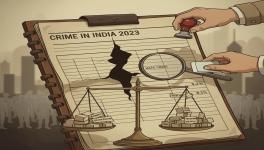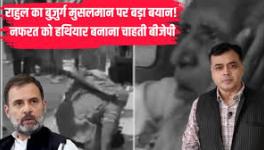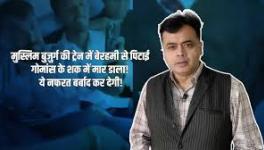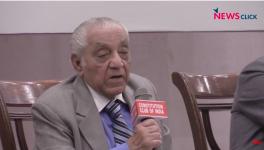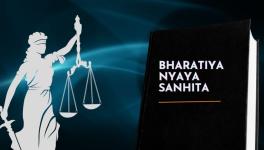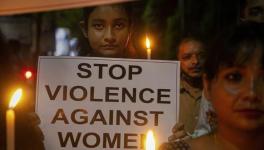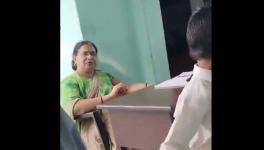Muzaffarnagar School Viral Video: A Teacher Who Teaches Hate Crime
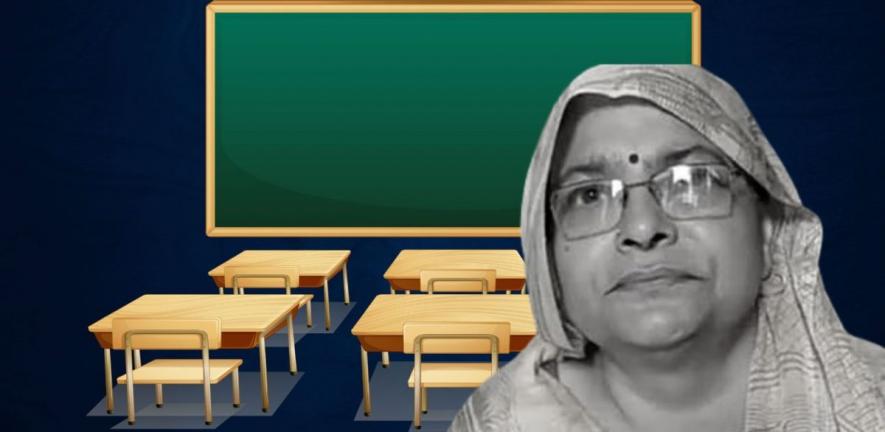
Representational Image.
Why are hate crimes not taken seriously in our country and why is there still not a rigid definition and corresponding punishment for an offence that hits at the very core of the fraternity and brotherhood in our nation?
—
A video of a child being slapped by his classmates on the command of their teacher, Tripta Tyagi, at a private school in Muzaffarnagar has gone viral.
To be honest, I could not gather the courage to watch the video. It was too painful to watch a young boy being slapped and kicked, purportedly for the crime of being a Muslim.
It was too painful to even imagine what he has been put through and the generational trauma his teacher has inflicted upon him and his family.
We live in a country and an atmosphere where communal violence, especially against the minorities, has become so banal that sometimes we become numb to the knife-sharp edge of its cruelty and the heavy weight of its sadism.
Unlike other communal events that have taken place in recent times, this incident shook me the most as it was carried out in an ostensibly safe space by a person who is trusted to guide and protect children.
I am sure he would have friends in the same class, with whom he would be playing like an equal, but his teacher did not think that he is equal to the other students.
It is heartbreaking to think about Tripta Tyagi and the venom filled inside her. Is she raising future leaders or future lynchers?
It is heartbreaking to think about Tripta Tyagi and the venom filled inside her. Is she raising future leaders or future lynchers?
Dr S. Radhakrishnan, the great Indian teacher and philosopher on whose birthday we all celebrate Teachers’ Day since 1962, once said “A good teacher is like a candle, it consumes itself to light the way for others”.
This speaks to the sentiment in Allam Iqbal’s poem ‘Bachche ki Dua’: “Zindagi shama ki surat ho khudai meri, dur duniya ka mere dam se andhera ho jaye, har jagha mere chamakne se ujala ho jaye.” (Oh God, let my life be like a candle, which dissipates darkness and spreads light everywhere.)
Incidentally, two teachers in UP’s Bareilly district were booked for reciting the poem during morning assembly last year.
So though it is unfortunate, perhaps it is not surprising then that Tripta Tyagi is consuming others and is lighting the way for others to consume further.
Earlier this year, while hearing a petition filed by a Muslim man, a division Bench of Justice K.M. Joseph and Justice B.V. Nagaratna had said that “there cannot be any compromise on hate speech” while adding that only when the State acknowledges such crimes can a solution be found.
The petitioner had alleged that he was attacked and abused in the name of his religion by a ‘screwdriver gang’ as he boarded a car to go to Aligarh from Noida on July 4, 2021 but the police had refused to register his complaint.
During the proceedings, Justice Joseph also said, “Be it in the minority or the majority, certain rights are inherent in human beings.
“You are born into a family and raised in one. We have no choice on our religion, but we stand out as a nation. That is the beauty, the greatness of our nation. We have to understand this.”
The Bench reprimanded the police for its failure to register a complaint of a person who was subjected to violence on the basis of his religion.
While hearing a petition filed by a Muslim man, a division Bench of Justice K.M. Joseph and Justice B.V. Nagaratna had said that “there cannot be any compromise on hate speech” while adding that only when the State acknowledges such crimes can a solution be found.
Such crimes are hate crimes and as the Bench of Justice K.M. Joseph and Justice B.V. Nagaratna said, recognition of hate crime by the State is essential to find a solution.
Hate crime
An attempt at finding a solution must start with defining hate crime.
Borrowing from Mark Walters, who is a professor of criminal law and criminology at the University of Sussex and an expert in the field of hate studies, “Hate crimes are offences which are motivated, or partly motivated, by prejudice, bigotry, or animus based on the victim’s group-based identity traits.”
In the Indian context, it can be safely stated that offences in which the perpetrator is motivated by hatred arising out of certain prejudices and personal biases of race, religion, sexual orientation and ethnicity are hate crimes.
However, in order to successfully deal with the rising incidents of hate crime, it is incumbent upon the legislature to give it a definition after analysing the nature of hate crimes.
If the legislature fails to do so, the courts should utilise their power to take suo motu cognisance of hate crimes, pass stringent Orders against perpetrators, instigators, onlookers, including the police and, in the process, give a clear definition of hate crime, thus sending a loud and clear message.
Hate crimes against minorities is not a new phenomenon in India. However, no law in the country specifically recognises hate crime as a separate class of crimes.
Instances of hate crime are dealt with under Sections 153A, 295, 295A and 298 of the Indian Penal Code (IPC), 1860 and The Scheduled Castes and the Scheduled Tribes (Prevention of Atrocities) Act, 1989.
Despite such provisions, hate crimes have not been tackled successfully in any form.
The IPC contains many provisions with stringent punishments. Unfortunately, all the provisions under which hate crime is sought to be punished provide milder punishments, which fail to act as a deterrent.
Tripta Tyagi’s case is a classic example of this phenomenon. She has been charged under Sections 323 (punishment for voluntarily causing hurt) and 504 (intentional insult with intent to provoke breach of peace), which are both non-cognisable and bailable offences.
Justice Joseph said, “Be it in the minority or the majority, certain rights are inherent in human beings. You are born into a family and raised in one. We have no choice on our religion, but we stand out as a nation. That is the beauty, the greatness of our nation. We have to understand this.”
It will be a thing to watch out for— the impact of the FIR and shutting down of school on hate crimes in the name of religion.
Well, Tyagi certainly is not ashamed and has the support of the villagers as stated by her to NDTV.
In Tehseen S. Poonawalla versus Union of India and Ors, (2018), the Supreme Court condemned the “sweeping phenomenon” of lynching and mob violence, which were inflicted in the name cow protection, love jihad and child abduction.
The Court observed that: “[A] bystander’s apathy and numbness of the mute spectators of the crime scene coupled with inefficient legislation and even woeful implementation facilitates this epidemic to manifest the entire country in a state of anarchy and lawlessness.
“The sole solution to this inhumane epidemic is to adopt a zero-tolerance approach towards this crime coupled with rapid legislation and prompt implementation.”
A series of preventive, remedial and punitive measures were passed by the court to tackle the problem of mob lynching in that case.
The court also recommended the Parliament to create a specialised offence for mob lynching and allocate adequate punishment for the same.
The Supreme Court did not provide a concrete and realistic definition of mob lynching and left it upon the Parliament to do so.
Hate crime, nowhere defined
The ministry of home affairs discontinued the exercise of hate crime data collection by the National Crime Records Bureau in 2021, calling it “unreliable” due to the imprecise definition of hate crime.
If the lack of a definition was the principal cause for not revealing the data on hate crime, then hate crime must be defined, since a path towards a solution out of the hate crime-quagmire we are stuck in can only be forged on the strength of proper and extensive statistics.
A few months ago, a police station in the northeast district of Delhi refused to register a complaint of my client, who was accused of chasing a girl and beaten by a mob of 15–20 people.
The ministry of home affairs discontinued the exercise of hate crime data collection by the National Crime Records Bureau in 2021, calling it “unreliable” due to the imprecise definition of hate crime.
An FIR was registered against him under The Protection of Children from Sexual Offences Act, 2012 as there were allegations against him of following the girl, who was a minor.
But what about his complaint of being physically assaulted for the alleged crime, humiliated in the name of his religion, his beard being pulled and communal slurs raised against him.
That complaint was never registered.
The police did not think that there is any merit in what he is saying, since he was an accused.
It is said that two wrongs do not make a right. The guidelines of the Supreme Court in Poonawala were sidelined and my client was administered the justice of the street.
Only after the intervention of the court through Section 156(3) of The Criminal Procedure Code, 1973 did the police register an FIR under Sections 319 (hurt) and 340 (wrongful confinement) against the mob who had beaten him up.
But do these Sections address the communal elements of the offence? Unlikely.
Cherry on the cake
The proposed Bharatiya Nyaya Sanhita, 2023, that seeks to replace the IPC, does not define mob lynching.
However, clause 2 of Section 101 of the Bill states: “When a group of five or more persons acting in concert commits murder on the ground of race, caste or community, sex, place of birth, language, personal belief or any other ground each member of such group shall be punished with death or with imprisonment for life or imprisonment for a term which shall not be less than seven years, and shall also be liable to fine.”
Let us see which way the Bill, which has been the subject of widespread criticism, goes from here.
Dr Ambedkar famously said that: “Equality may be a fiction but nonetheless one must accept it as a governing principle.”
At the core of modern democracy lies equality, freedom and dignity which is fostered by a constitution.
In days like these, when there is rise in majoritarian politics, the courts have and must keep standing as a protective shield for citizens, a duty cast upon them by the Constitution.
The courts must keep reminding everyone that India is a secular nation and every citizen is equal.
Lastly, India is such a diverse country, with so many languages, cuisines, culture, dance forms, etc., that an Indian citizen is trained to see and respect diversity.
India has been about co-existence and will always be; it is for you to realise it and question what has been fed to you— sooner the better.
As Justice Joseph said: “If you ignore this (hate crime), then one day it will come for you.”
Deeksha Dwivedi is a New Delhi-based criminal lawyer.
Get the latest reports & analysis with people's perspective on Protests, movements & deep analytical videos, discussions of the current affairs in your Telegram app. Subscribe to NewsClick's Telegram channel & get Real-Time updates on stories, as they get published on our website.









